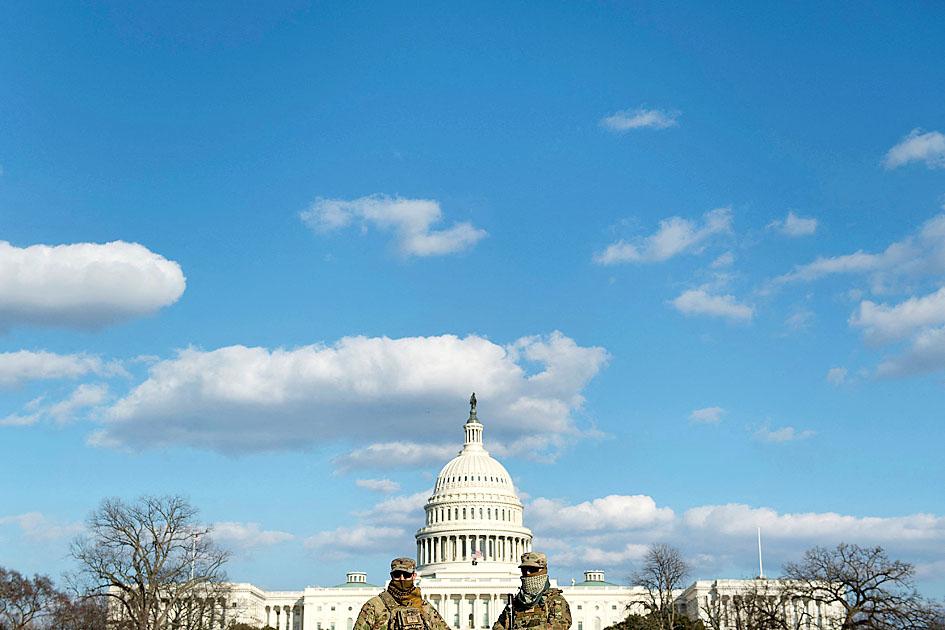Taiwan’s efforts to protect trade secrets have been recognized by the Office of the US Trade Representative’s (USTR) annual Special 301 Report, which was released on Friday.
In the first edition to be issued under US Trade Representative Katherine Tai (戴琪), the agency highlighted a case in Taiwan where an amended Trade Secrets Act (營業秘密法) enabled a court to find a local semiconductor company and three former employees guilty of stealing trade secrets from a US company in an attempt to help a Chinese state-owned enterprise develop a computer chip.
The court fined the firm US$3.4 million and sentenced the former employees to five to six years in jail, the report said.

Photo: AFP
The court’s decision is the “most significant criminal case” in Taiwan’s protection of trade secrets, the report said, adding that the “case involved substantial cooperation with US investigators and prosecutors.”
The Special 301 Report reviews the global state of intellectual property (IP) protection and enforcement, said the USTR, which conducts the review pursuant to Section 182 of the US’ Trade Act of 1974, as amended by the US’ Omnibus Trade and Competitiveness Act of 1988 and its Uruguay Round Agreements Act.
In the report, the agency praised cooperation between the Taiwanese government and the American Institute in Taiwan (AIT), the de facto US embassy in Taiwan, on the protection of IP rights.
The government and the AIT held a virtual training session for law enforcement experts from Taiwan and the US, which enabled them to share information on the protection of trade secrets and the prevention of digital piracy, the report said.
“Several trading partners have recently strengthened or have been working toward strengthening their trade secret regimes, including the EU and Taiwan,” it added.
However, Taiwan was among the markets — such as Argentina, Brazil, China, Hong Kong, Iraq, Singapore and Thailand — that reported “notable” levels of streaming piracy through illicit streaming devices and illicit Internet protocol television (IPTV) service apps, the report said.
China has even served as a manufacturing hub for the devices, while Iraq is reportedly a source of satellite receivers pre-loaded with pirated IPTV apps, it said.
Regarding China, Washington has been closely monitoring Beijing’s progress in implementing its commitments under their “phase one” trade deal, it added.
While China last year amended its patent, copyright and criminal laws, the reforms require effective implementation and fall short of the full range of fundamental changes needed to improve the IP landscape in the country, the USTR said.
China is still on the USTR’s “priority watchlist” of nations whose practices require monitoring.
Argentina, Chile, India, Indonesia, Russia, Saudi Arabia, Ukraine and Venezuela are also on the list.
The annual report details its findings of more than 100 trading partners after significant research and enhanced engagement with stakeholders, the USTR said.

Taiwan’s rapidly aging population is fueling a sharp increase in homes occupied solely by elderly people, a trend that is reshaping the nation’s housing market and social fabric, real-estate brokers said yesterday. About 850,000 residences were occupied by elderly people in the first quarter, including 655,000 that housed only one resident, the Ministry of the Interior said. The figures have nearly doubled from a decade earlier, Great Home Realty Co (大家房屋) said, as people aged 65 and older now make up 20.8 percent of the population. “The so-called silver tsunami represents more than just a demographic shift — it could fundamentally redefine the

The US government on Wednesday sanctioned more than two dozen companies in China, Turkey and the United Arab Emirates, including offshoots of a US chip firm, accusing the businesses of providing illicit support to Iran’s military or proxies. The US Department of Commerce included two subsidiaries of US-based chip distributor Arrow Electronics Inc (艾睿電子) on its so-called entity list published on the federal register for facilitating purchases by Iran’s proxies of US tech. Arrow spokesman John Hourigan said that the subsidiaries have been operating in full compliance with US export control regulations and his company is discussing with the US Bureau of

Businesses across the global semiconductor supply chain are bracing themselves for disruptions from an escalating trade war, after China imposed curbs on rare earth mineral exports and the US responded with additional tariffs and restrictions on software sales to the Asian nation. China’s restrictions, the most targeted move yet to limit supplies of rare earth materials, represent the first major attempt by Beijing to exercise long-arm jurisdiction over foreign companies to target the semiconductor industry, threatening to stall the chips powering the artificial intelligence (AI) boom. They prompted US President Donald Trump on Friday to announce that he would impose an additional

China Airlines Ltd (CAL, 中華航空) said it expects peak season effects in the fourth quarter to continue to boost demand for passenger flights and cargo services, after reporting its second-highest-ever September sales on Monday. The carrier said it posted NT$15.88 billion (US$517 million) in consolidated sales last month, trailing only September last year’s NT$16.01 billion. Last month, CAL generated NT$8.77 billion from its passenger flights and NT$5.37 billion from cargo services, it said. In the first nine months of this year, the carrier posted NT$154.93 billion in cumulative sales, up 2.62 percent from a year earlier, marking the second-highest level for the January-September